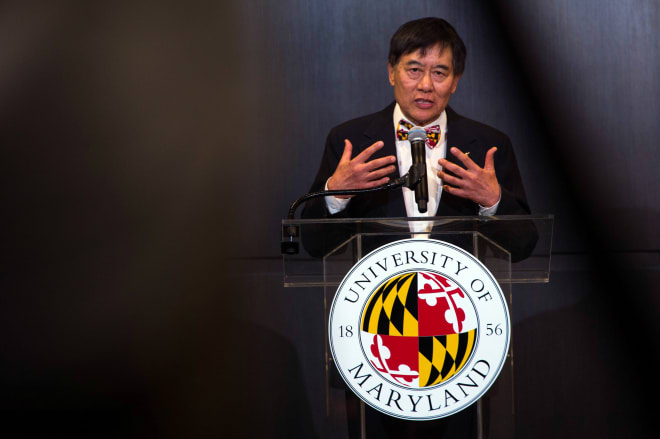Maryland tragedy puts focus on need for independent athletic trainers

The University of Maryland's head strength coach has resigned. One or more of the Terrapins' athletic trainers will probably be next.
That much was clear after watching the riveting and revealing press conference held Tuesday by Maryland President Wallace D. Loh and Athletics Director Damon Evans. The presser came about two months after redshirt freshman offensive lineman Jordan McNair died of heatstroke following a rigorous offseason workout, and just a few days after a blistering ESPN report alleged that the Terrapins' football program is plagued by a "toxic culture" of bullying and abuse.
Maryland's administrators made it clear Tuesday that they are not shying away from the university's role in McNair's death, saying they accept, "legal and moral responsibility for the mistakes that our training staff made on the fateful workout day of May 29.” They also are putting together an independent panel to investigate the many allegations facing the program and to ultimately decide the fate of head football coach DJ Durkin and others.
Some college football pundits believe Durkin is as good as gone. Others aren't so sure.
*ALSO SEE: Updates, observations, interviews from FSU's Wednesday practice
We'll likely have to wait days or weeks to find out what happens there, but no matter the result, nothing Maryland does now will bring McNair back to his family. The tragedy has already happened. A promising young man's life has been lost.
What can happen, however, is the University of Maryland and schools around the country can take a long, hard, honest look at their athletic training staffs. They can examine how exactly those staffs are managed and how much undue influence coaches have over them -- either directly or indirectly.
They can ask themselves who recommends these trainers for their positions. Who hires them and who fires them? Who do they report to?
And we're not talking about who they report to on paper. We're talking about who they report to in the real world. Who really determines whether they are doing satisfactory work?
While I can't speak to what happened at Maryland -- nor can I say what happens on all college campuses around the country -- I can tell you that powerful college football coaches often have a major say in determining who serves as their program's head athletic trainer. They may not officially be the direct supervisor, but they often are the ones calling the shots.
We saw it here recently when FSU's head athletic trainer for football, Jake Pfeil, was courted by Jimbo Fisher to come work at Texas A&M. Pfeil, a Florida State graduate, ended up staying in Tallahassee and now serves on Willie Taggart's staff. But if he had been interested in joining the Aggies, the job would have been his -- because Fisher wanted him.
We have seem it on other campuses as well. Tennessee, for example, recently hired Jeronimo Boche as its head athletic trainer for football. The connection there isn't very difficult to find -- Boche previously served as an assistant athletic trainer at FSU, where he worked with new Tennessee head coach Jeremy Pruitt in 2013.
The reports out of Knoxville didn't even attempt to hide the fact that Pruitt made that hire. From a story on Volquest.com: "Tennessee head coach Jeremy Pruitt has filled his head trainer position for his football program. Following spring practice, Pruitt parted ways with head football trainer John Burnside, and on Thursday, Tennessee’s first-year head coach welcomed Jeronimo Boche ... for the same role."
These aren't isolated situations.
About five years ago, as public scrutiny mounted about the long-term dangers of concussions, the Chronicle of Higher Education reported results from a survey of 101 athletic trainers in NCAA football programs. Some 32 of the trainers surveyed said that a member of the football coaching staff had influence over the hiring and firing of their positions. And 53 of the 101 said they had felt pressure from football coaches to clear players to return faster than they thought was in the student's best interest.
Let those numbers sink in for a moment.
More than half of those surveyed said they feel pressure from coaches to send players back into battle before they are ready. And nearly one-third said that coaches determine who sits in their chair.
How have we let this happen?
What's perhaps most incredible about all of this is that universities go to great lengths to keep the proverbial fox out of the hen house when it comes to academics. They'll tell anyone who will listen that the academic support staff reports to the university, and not the head football coach.
But we're OK with letting coaches have influence over the people charged with protecting player safety? How does that make any sense?
In a perfect world, all of this would be a moot point. We wouldn't have to worry about the implications of that arrangement because the coaches would always put the well-being of the student-athletes above all else. Isn't that what they tell parents during recruiting visits?
Unfortunately, we don't live in a perfect world. And even officials at the conference and NCAA levels recognize that.
Starting in 2015, several conferences started having "independent medical observers" watch college games from the press box to determine if players needed to be removed for medical evaluation. These observers are specifically not allowed to be employees of the participating schools, for obvious reasons. They are there for one purpose and one purpose only -- to protect the welfare of the players.
So if we recognize that an independent observer is needed to look out for these athletes during games, why would anyone think it's OK to have coaches determining -- or at least heavily influencing -- which athletic trainers get hired or fired? Or promoted or demoted?
It's absurd.
Now, we have to acknowledge that we don't know all of the details that led to Jordan McNair's death. I guess it's conceivable that the coaching staff did nothing wrong. That they stood by helplessly as a rogue strength coach pushed McNair too far, and an incompetent athletic training staff grossly misdiagnosed the situation.
Perhaps that's possible.
Or maybe it's more likely that the strength coaches and athletic trainers are doing what the head coach wants them to do. That the guy making the highest salary -- the one with the most to gain and lose based on wins and losses -- is influencing their actions because he can. Because the universities are letting it happen.
To be clear, I'm not suggesting that all -- or even most -- college football coaches are purposefully disregarding the safety of their players. Nor do I think most -- or even many -- athletic trainers are letting coaches walk all over them. I've seen and heard numerous stories of trainers standing up to coaches when it comes to student welfare. And I can say unequivocally that I've always been impressed by the work of FSU's athletic training staff.
But as long as schools allow coaches to have influence over the men and women in those positions, there will always be concerns about who they're really serving.
Until now, the NCAA has allowed universities to figure out how to best manage their athletic training staffs. They have released a list of "best practices," where they explicitly discourage conflicts of interest such as allowing coaches to have input in hiring and firing and determining when students are ready to compete, but nothing is mandated.
And who knows if a formal mandate will ever come? The trend in recent years has been for the NCAA to have less stringent oversight of university business, not more -- especially at the Power 5 level.
But the reality is Maryland and other schools don't have to wait for the NCAA to step in. They can do what they should have been doing all along.
College football coaches should have complete control over what players do during practices and games, and who deserves to play based on merit. They should have absolutely zero control -- directly or indirectly -- when it comes to deciding which players are medically and physically fit to participate in those games or practices.
That should have been the case before this latest tragedy. It must be the case after it.
Contact managing editor Ira Schoffel at ira@warchant.com and follow @IraSchoffel on Twitter.
-----------------------------------------------------
Discuss this story with other die-hard FSU fans on the Tribal Council.
